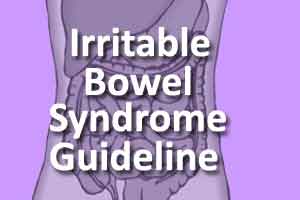- Home
- Editorial
- News
- Practice Guidelines
- Anesthesiology Guidelines
- Cancer Guidelines
- Cardiac Sciences Guidelines
- Critical Care Guidelines
- Dentistry Guidelines
- Dermatology Guidelines
- Diabetes and Endo Guidelines
- Diagnostics Guidelines
- ENT Guidelines
- Featured Practice Guidelines
- Gastroenterology Guidelines
- Geriatrics Guidelines
- Medicine Guidelines
- Nephrology Guidelines
- Neurosciences Guidelines
- Obs and Gynae Guidelines
- Ophthalmology Guidelines
- Orthopaedics Guidelines
- Paediatrics Guidelines
- Psychiatry Guidelines
- Pulmonology Guidelines
- Radiology Guidelines
- Surgery Guidelines
- Urology Guidelines
Irritable Bowel Syndrome- American Gastroenterological Association Guideline

Irritable bowel syndrome (IBS) is a common disorder that affects the large intestine (colon). Irritable bowel syndrome commonly causes cramping, abdominal pain, bloating, gas, diarrhoea and constipation. IBS is a chronic condition that one needs to manage long term.Even though signs and symptoms are uncomfortable, IBS — unlike ulcerative colitis and Crohn's disease, which are forms of inflammatory bowel disease — doesn't cause changes in bowel tissue or increase the risk of colorectal cancer.Only a small number of people with irritable bowel syndrome have severe signs and symptoms. Some people can control their symptoms by managing diet, lifestyle and stress. Others need medication and counselling.
In the year 2014, American Gastroenterogical Association came out with guidelines on Pharmacological Treatment of Irritable Bowel Syndrome. The major recommendation of the guidelines ( in question and answer format ) are given as follows:-
- Should linaclotide be used in patients with irritable bowel syndrome with constipation-predominant symptoms (IBS-C)?
The American Gastroenterological Association (AGA) recommends using linaclotide (over no drug treatment) in patients with IBS-C. (Strong recommendation)Comments: Patients who place a high value on avoiding diarrhoea and avoiding higher out-of-pocket expenses associated with linaclotide may prefer alternate treatments.
- Should lubiprostone be used in patients with IBS-C?
The AGA suggests using lubiprostone (over no drug treatment) in patients with IBS-C. (Conditional recommendation)Comments: Patients who place a high value on avoiding higher out-of-pocket expenses associated with lubiprostone may prefer alternate treatments.
- Should polyethylene glycol (PEG) laxatives be used in patients with IBS-C?
The AGA suggests using laxatives (over no drug treatment) in patients with IBS-C. (Conditional recommendation)
- Should rifaximin be used in patients with IBS with diarrhea-predominant symptoms (IBS-D)?
The AGA suggests using rifaximin (over no drug treatment) in patients with IBS-D. (Conditional recommendation)
- Should alosetron be used in patients with IBS-D?
The AGA suggests using alosetron (over no drug treatment) in patients with IBS-D to improve global symptoms. (Conditional recommendation)
- Should loperamide be used in patients with IBS-D?
The AGA suggests using loperamide (over no drug treatment) in patients with IBS-D. (Conditional recommendation)
- Should tricyclic antidepressants be used in patients with irritable bowel syndrome (IBS)?
The AGA suggests using tricyclic antidepressants (over no drug treatment) in patients with IBS. (Conditional recommendation)
- Should selective serotonin reuptake inhibitors be used in patients with IBS?
The AGA suggests against using selective serotonin reuptake inhibitors for patients with IBS. (Conditional recommendation)
- Should antispasmodics be used in patients with IBS?
The AGA suggests using antispasmodics (over no drug treatment) in patients with IBS. (Conditional recommendation)
http://www.ncbi.nlm.nih.gov/pubmed/16836950

Disclaimer: This site is primarily intended for healthcare professionals. Any content/information on this website does not replace the advice of medical and/or health professionals and should not be construed as medical/diagnostic advice/endorsement or prescription. Use of this site is subject to our terms of use, privacy policy, advertisement policy. © 2020 Minerva Medical Treatment Pvt Ltd